June 2, 2021
Publications
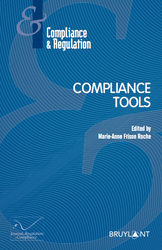
Full Reference : Frison-Roche, M.-A..,Rights, primary and natural Compliance Tools, in Frison-Roche, M.-A. (ed.), Compliance Tools, series "Régulations & Compliance", Journal of Regulation & Compliance (JoRC) and Bruylant, 2021, p. 319-342
___
Article Summary: In the traditional conception of the architecture of the sectors regulated by Law, and in Compliance Law which extends the regulatory techniques, rights have little place. But this configuration no longer takes place; on the contrary, rights are at the center of Regulatory and Compliance systems, and will be more and more so. They are and will be the primary tools of Compliance Law because they constitute a very effective "tool" to ensure the entire functioning of a system whose goals are so difficult to achieve. Because every effort must be done to achieve these goals, the public authorities not only rely on the power of crucial operators, but also distribute prerogatives to people and organizations who, thus encouraged, activate the Compliance system and participate in the achievement of the "monumental goal". Rights can prove to be the most effective tools for actually achieving the goals set, so much so that they can be seen as "primary tools".
But it is pertinent to have more pretension and to conceive rights as the most "natural" tools of Compliance Law. Indeed because all the Monumental Goals by which Compliance Law is defined can be expressed by the protection of persons, that is to say to the effectiveness of their prerogatives, by a mirror effect between rights. given as tools by Law by to persons and rights which constitute the very goal of all Compliance Law, in particular the protection of all human beings, even if they are in a situation of great weakness, rights becoming a "natural tool" of Compliance Law.
We are only at the beginning of their deployment and it is undoubtedly on them that Digital space in which we now live would be regulated, so that we will not suffocated there and that it will constitute for people a civilized space.
____
Read the General Presentation of the book in which this article has been published
____
June 2, 2021
Publications

General reference : Frison-Roche, M.-A., Drawing up Risk Maps as an Obligation and the paradoxe of the "Compliance Risks", in Frison-Roche, M.-A. (ed.), Compliance Tools, serie "Régulations & Compliance", Journal of Regulation & Compliance (JoRC) and Bruylant, 2021, p. 61-72
___
Summary of the article :
There are few synthetic or theoretical studies on Risk Mapping even though it is in fact the Compliance central tool, perhaps because it is more a management tool than a legal one. Risk Mapping is often described but does not receive any other legal qualifications than being a "modality", suffering in this respect from an evil which affects the whole of Compliance, still little understood by Law, attention often so focused on the Ex Post (sanctions) while Compliance is by nature in the Ex Ante. Going from disarray to incomprehension, everyone can note the existence of "compliance risks" among the mapped risks, because if as so many affirm that it would be necessary to speak only of simple conformity as obedience, demonstrated in Ex Ante, to Law, how a sub-set of a tool would therefore have the same object as the set of Law that this tool serves ... This aporia can only be resolved if Compliance Law is defined substantially by its "monumental goals" which exceed obedience to regulations.
Consequently, Law taking up Risk Mapping, this mechanism may first appear as an ancillary obligation to the main obligation consisting in achieving "monumental goals". The ancillary obligation to draw up the maps is an obligation of result, while the main obligation to achieve the monumental goals is an obligation of means. These cartographies being very diverse and being only occasionally targeted by specific laws, it can also constitute only a legal fact or, through the play of various charters, a unilateral legal commitment. But it isnbecoming the basis of an autonomous legal obligation incumbent on enterprises in position to know certain risks, obligation referring to the existence of a subjective right tof knowing and measuring them ("right to be worried") which the third parties who are going to run them would hold, thus allowing them to choose to run them, or not.
____
Read a general presentation of the book in which the article is published
____
June 2, 2021
Publications

Full reference : Frison-Roche, M.-A., Incentives and Compliance, a promising couple to increase the Compliance Law utility, in Frison-Roche, M.-A. (ed.), Compliance Tools, series "Régulations & Compliance", Journal of Regulation & Compliance and Bruylant, 2021, p. 141-148
___
Summary of the article: The theory of incentives targets the mechanisms which do not use directly constraint (except to present sanctions themselves as incentives) but which leads nevertheless to expected behaviors. To appreciate the links which must or must not be done between incentives and Compliance, we should proceed in two times.
First, the association appears natural between incentive mechanisms and "Compliance Law" since the later is defined in a dynamic way. Indeed, if it is defined placing its legal normativity in its "monumental goals", as the end of corruption, the detection of money laundering in order to underlying criminality disappears, or as the effective protection of environment or the concrete care of human beings, then what matters is not the means in themselves but the effective tension towards these "monumental goals". In this perspective, what was related to public policies led by States, because they are definitively not able to do it, the charge is internalized in the firms which are able to tend towards this goals: "crucial operators" because they have the geographical, technological, informational and financial means.
In this perspective, the internalization of public willingness provoking a split with the concept of State linked to a territory which deprives Politics of its constraint power, incentive mechanisms appear as the most efficient mean to reach these monumental goals. They appear as this "natural" mean both negatively and positively defined. Negatively in which they do not need in Ex Ante institutional localizable sources and sanction power in Ex Post: it is enough to substitute the interest to obligation. Positively, incentives relay through operators' strategies what was the so critical and joked form of public action: the "plan". The duration is thus injected thanks to Compliance mechanisms, as we can see it through the development of it in the care for environment ("plan climat") or through the educational mechanism, which could be conceived only in duration.
However, the opposition seems radical between Compliance Law and Incentives. And this because of three convictions often developed and that we have to overcome. First, the idea that in a general way, there would be a Law only if there is a mechanism of immediate constraint which is associated to the norm. As long as the incentive is not based on obligation, then it will be nothing... Secondly, and as if that were a kind of consolation ..., Compliance would not be really Law either ... We so often say that it is only about a methodology, a range of processes without sense, procedures to follow without trying to understand, process that algorithms integrate in a mechanic without end and without sense or that on the contrary, Compliance would be full of sense by Ethics and Morality, which are far from Law. While incentives talk to the human spirit which calculate, Compliance would be so a process through which machines will be connected to other machines, so an extra soul, where calculation has no place... Thirdly, solutions would be to be find in Competition Law because it can do without States, submit them and approach what is a-sectorial, especially finance and digital, the world being financialized and digitalized. The violence of Competition Law which comes in Ex Ante thanks to "Compliance sanctions" applying for example to essential infrastructures Law, by continuing to deny the salience of the duration and taking care of the "market power" would be also not compatible with a marriage with incentive mechanisms which rely on duration and power of those to which it is applied, converging towards goals, which are set by what Competition Law ignores: the project. This project which pretends to build the future is the one of politics and of companies, which use their deployed power in time to concretize it. It is without any doubt there that the future of Europe is.
To overcome this triple difficulty, it is thus necessary, in a second time, to modify our conception of Law, especially thanks to Compliance Law, in which this new branch is autonomous from Competition Law, and even sometimes opposed to it, in order to the insertion of incentive mechanisms permit to unknown or against Competition Law organizations to reach "monumental goals" which are imperative to take into consideration. For example, the taking into consideration of climate challenges or the building of a sovereign identity of the data. This is expressly set by European Commission which supervises such initiatives, supervision being what is articulated with Compliance, in a couple that go beyond Regulation, and replaces in Ex Ante Competition Law, salient branch for Ex Post. All the texts which are in the process of expressing it are based on this reformed couple: Compliance and Incentive.
This couple supposes that we recognize as such the existence of companies as project carriers, project which is the creation of marketed wealth circulating on a market, which could be an industrial project specific to a geographical zone both economical and political. Regulation is deployed to go away from the notion of sector and to transform itself in supervision of crucial firms in the correspondance between the project and the action, what refers to the notion of "plan". In this, banking supervision is just the advanced bastion of all thematic, energetic, climatic and health plans, or more broadly industrial and technological that could by incentive be implemented, this conception of Compliance permitting to build zones which are not reduced to immediate market exchange. The incentive corresponds to the fact that Compliance Law relies on the power of the firm to reach its own political goals, for example fighting against disinformation in the digital space or obtaining a healthy environnement. This supposes that Compliance stops to be only conceived as a model of rules effectivity, for example of Competition Law, to be recognized as a substantial branch of Law. A branch which expresses political goals. A branch which is anchored in crucial firms whose it recognizes the autonomy with regards to markets. This makes it possible, in particular through the coupling with incentive mechanisms leading to long-term collaborative operations supervised by public authorities, not to be governed by simple Competition Law, inapt to bring projects to fruition.
____
Read a general presentation of the book in which the article has been published.
____
June 2, 2021
Publications

Full Reference: Frison-Roche, M.-A., Training: content and container of Compliance Law, in Frison-Roche, M.-A. (ed.), Compliance tools, series "Régulations & Compliance", Journal of Regulation & Compliance (JoRC) and Bruylant, 2021, p. 245-264
___
Summary of the article
Firstly, as Training is a specific Compliance tool, it is supervised by Regulators. It becomes mandatory when it is contained in Compliance programs or sanction decisions. Since effectiveness and efficiency are legal requirements, what is the margin of companies to design them and how to measure the result?
Secondly, as long as each Compliance tool includes, more and more, an educational dimension, we can take each of them to identify this perspective. So even condemnations and prescriptions are so many lessons, lessons given, lessons to be followed. The question is then to know who, in this so pedagogical Compliance Law, are the "teachers"?
____
This article is based on a bilingual Working Paper, including additional technical developments, pop-up notes and hypertext links.
Consult an overview of the volume in which the article was published.
____
June 2, 2021
Publications

► Full reference : Frison-Roche, M.-A., Building by Law the Unicity of Compliance Tools from the Definition of Compliance Law by its "Monumental Goals", in Frison-Roche, M.-A. (ed.), Compliance Tools, serie "Régulations & Compliance", Journal of Regulation & Compliance (JoRC) and Bruylant, 2021, pp. 35-46
Summary of the article : The "tools of Compliance" do not stack on top of each other. They form a system, thanks to a unity drawn from the goals that all these multiple and different tools serve: the "Monumental Goals" by which Compliance Law is defined.
All these tools are configured by these goals and for mastering all these techniques, it is essential to put them all in perspective of what Compliance Law is, which is designed teleologically with regard to its goals. Extension of Regulatory Law and like it, Compliance Law is built on a balance between the principle of competition and other concerns that public authorities claim to take care of. Compliance Law has moreover more "pretensions" in this respect, for example in environmental matters. All the means are then good, the violence of the tools marrying without difficulty with the voluntary commitments since it is the goals which govern this branch of Law.
As legal solutions adopted show, a common method of interpretation and common levels of constraint for all Compliance Tools result from this definition. Starting from the goals (in which legal normativity is housed), the interpretation of the different tools is thus unified. Moreover, the different degrees of constraint do not operate according to the consideration of sources (traditional legal criterion) but by the goals, according to the legal distinction between obligations of means and obligations of results which result from the articulation between tools, of which the establishment is an obligation of result, and the goal, of which the achievement is only an obligation of means.
____
📝 Read the bilingual working paper on which rely this article.
📝 Read a general presentation of the book in which this article has been published.
____
April 21, 2021
Publications

Full reference : Frison-Roche, M.-A., Questionnaire de Proust (Proust's Quiz), in Droit & Littérature, n°5, p.37-38, Lextenso, 2021.
The chosen topic for this volume is Proust.
Read (in French)
See its presentation on LinkedIn (in French)
April 21, 2021
Publications
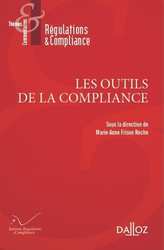
► Full Reference: M.-A. Frison-Roche, "Approche juridique des outils de la Compliance. Construire juridiquement l'unité des outils de la Compliance à partir de la définition du Droit de la Compliance par ses "buts monumentaux"" ("Legal approach to Compliance Tools. Building by Law the Unicity of Compliance Tools from the definition of Compliance Law by its "Monumental Goals""), in M.-A. Frison-Roche, (ed.), Les outils de la Compliance, coll. "Régulations & Compliance", Journal of Regulation & Compliance (JoRC) and Dalloz, 2021, p. 27-38.
____
📝read the article (in French)
____
🚧read the bilingual Working Paper which is the basis of this article, with more developments, technical references and hypertext links
____
📕read a general presentation of the book, Les outils de la Compliance, in which this article is published
____
► Summary of the article (done by the Journal of Regulation and Compliance): The "tools of Compliance" do not stack on top of each other. They form a system, thanks to a unity drawn from the goals that all these multiple and different tools serve: the "Monumental Goals" by which Compliance Law is defined.
All these tools are configured by these goals and for mastering all these techniques, it is essential to put them all in perspective of what Compliance Law is, which is designed teleologically with regard to its goals. Extension of Regulatory Law and like it, Compliance Law is built on a balance between the principle of competition and other concerns that public authorities claim to take care of. Compliance Law has moreover more "pretensions" in this respect, for example in environmental matters. All the means are then good, the violence of the tools marrying without difficulty with the voluntary commitments since it is the goals which govern this branch of Law.
As legal solutions adopted show, a common method of interpretation and common levels of constraint for all Compliance Tools result from this definition. Starting from the goals (in which legal normativity is housed), the interpretation of the different tools is thus unified. Moreover, the different degrees of constraint do not operate according to the consideration of sources (traditional legal criterion) but by the goals, according to the legal distinction between obligations of means and obligations of results which result from the articulation between tools, of which the establishment is an obligation of result, and the goal, of which the achievement is only an obligation of means.
________
Dec. 8, 2020
Publications

🌐follow Marie-Anne Frison-Roche on LinkedIn
🌐subscribe to the Newsletter MAFR Regulation, Compliance, Law
____
► Full Reference: M.-A. Frison-Roche, "La compliance" ("Compliance"), in J.-B. Racine (ed.), Le droit économique au XXIe siècle. Notions et enjeux, LGDJ, "Droit & Économie" Serie, 2020, pp. 97-108
____
📝read the article (in French)
____
🚧read the bilingual Working Paper which is the basis of this article, with additional developments, technical references and hyperlinks
____
📕read a general presentation of the book, Le droit économique au XXIe siècle. Notions et enjeux, in which this article is published
____
📚see the presentation of the other books published in this Serie, founded and directed by Marie-Anne Frison-Roche
► English Summary of the article:
________
Nov. 26, 2020
Publications
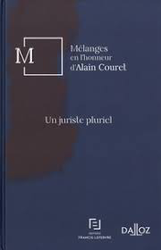
Full reference : Frison-Roche, M.A., Pour une conception humaniste du Droit des affaires et de son enseignement (For a humanist conception of Business Law and of its teaching), in Un juriste pluriel. Mélanges en l'honneur d'Alain Couret, Editions Francis Lefebvre and Dalloz, 2020, pp.985-990.
Read the article
Read the general presentation of the book in which this article has been published
Sept. 16, 2020
Publications
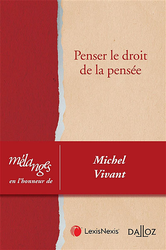
🌐follow Marie-Anne Frison-Roche on LinkedIn
🌐subscribe to the Newsletter MAFR Regulation, Compliance, Law
____
Full reference: M.-A. Frison-Roche, Se tenir bien dans l'espace numérique, in Penser le droit de la pensée. Mélanges en l'honneur de Michel Vivant, Lexis Nexis and Dalloz, 2020, pp. 155-168.
____
📝Read the article (in French)
____
English summary of the article: The digital space is one of the scarce spaces not framed by a specific branch of Law, Freedom also offering opportunity to its actors to not "behave well", that is to express and diffuse broadly and immediately hateful thoughts through Hate speechs, which remained before in private or limited circles. The intimacy of Law and of the legal notion of Person is broken: Digital permits to individuals or organizations to act as demultiplied and anonymous characters, digital depersonalized actors who carry behaviors that are hurtful to other's dignity.
Against that, Compliance Law offers an appropriate solution: internalizing in digital crucial operators the mission to disciplinary and substantially hold the digital space. The digital space has been structured by powerful firms able to maintain order. Because Law must not reduce digital space to be only a neutral market of digital prestations, these crucial operators, like social networks or search engines, must be forced to substantially control behaviors. It could be about an obligation of internet users to act with their face uncover, "real identity" policy controlled by firms, and to respect others' rights, privacy rights, dignity, intellectual property rights. In their Regulatory function, digital crucial firms must be supervised by public authorities.
Thus, Compliance law substantially defined is the protector of the person as "subject of law" in the digital space, by the respect that others must have, this space passing from the status of free space to the one of civilized space, in which everyone is obliged to behave well.
______
Read to go further:
- Frison-Roche, M.-A., L'apport du Droit de la Compliance à la gouvernance d'Internet, 2019
- Frison-Roche, M.-A. (dir.), Internet, un espace d'interrégulation, 2016
May 28, 2020
Publications
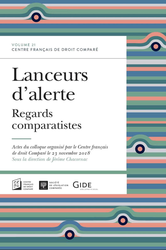
Full reference: Frison-Roche, M.-A., L'impossible unicité juridique de la catégorie des "lanceurs d'alertes" ("The impossible legal unicity of the category of "whistleblowers""), in Chacornac, J. (dir.), Lanceurs d'alertes, regards comparatistes, ("Whistleblowers, comparative perspectives"), Publications of the Centre français de droit comparé ("French Comparative Law Center"), May 2020, Volume 21, p.13-31.
Read the article (in French).
Read the general presentation of the collective book in which this article is published
Read the bilingual working paper which had served of basis for this article.
Read the presentation of the conference "Les lanceurs d'alertes: glose" (Whistleblowers: glose") and especially the slides elabored for the colloquium organized by the Centre français de droit comparé ("French Comparative Law Center") on 23th of November 2018 under the direction of Jérôme Chacornac
____
Introduction of the article
"Whistleblowers". This is a new expression. Which is a great success. Barely heard once, we hear it everywhere ...
A topic not of course or knowledge test, but rather a topic of daily conversation. Because it is spoken to us every day, in more or less gracious terms. For example President Donald Trump on October 1, 2019 declared to the press "want to question" the whistleblower who would have illegally denounced him and would not, according to him, have the right to conceal his identity, proof in this according to him of the lying character of his assertions against him, while his lawyer indicates on October 6, 2019 that he is not speaking on behalf of a single whistleblower thus taken to task but of a plurality of people who gave information against the President of the United States. Even the most imaginative screenwriters would not have written such brutal and rapid twists and turns. Spectators, we are waiting for the next episode, secretly hoping for the escalation.
And precisely if we go to the cinema, it is still a whistleblower whose dedication and success, we are told about, even the drama, for the benefit of global society, and in particular democracy, since the secrets are fought for the benefit of the truth. The Secret Man designates Mark Felt as the first whistleblower. Returning to what we often present as being a more "serious" media!footnote-1391, we listen to France-Culture and here is another story told by a historian who worked as an archivist on events that political power would have liked to keep hidden by possibly destroying their traces but which its trade led to preserve: here it is expressly presented to the studious listeners like a "whistleblower" .... While the same radio tries to find the one who could well be, as in a kind of contest the "first whistleblower"!footnote-1727? .... This rewriting of History can be defended because ultimately what did other Voltaire do for Calas, or Zola for Dreyfus?
It is also a subject of legislative discussion since in the United States the Dodd-Frank law of 2010 inserted in the law of 1934 which established the Securities & Exchanges Commission a complete device of remuneration and remuneration of the whistleblowers, whereas after having developed flexible but guiding lines in this regard in 2012!footnote-1698, the European Commission published on November 20, 2018 the text of what will become a Directive intended to give a unified European status to the character, in the system gradually developed to protect the one who was presented in 2018 as that "cannot be punished for having done what is right".
In Europe, the Directive first approved by a Resolution of the European Parliament on April 16, 2019 on the protection of persons denouncing breaches of Union Law and then adopted on October 7, 2019 (Directive of the European Parliament and of the Council of European Union on the Protection of Persons who Report Violations of European Union Law, different title, it should be noted, will have to be transposed into the laws of the Member States within the next two years. , since only "violations of Union Law" are targeted, but the character of the "whistleblower" is more generally targeted: he is "whole"!footnote-1699.
In short, the whistleblower is a star!footnote-1390. A sort of historical figure, covered in blows and glory, going from Voltaire to Snowden, both of whom find themselves embodied on the screens!footnote-1681 ....,
Consecrated by law, which associates with it a legal regime of protection to such an extent that, like a Nessus tunic, it is this legal regime which will define the character and not the reverse. When we read the law of December 9, 2016 relating to transparency in the fight against corruption and the modernization of economic life, known as "Sapin 2", we notice that the Legislator makes much of this character, since 'he dedicates its chapter II to him!footnote-1682: "From the protection of whistleblowers", and that it is by his very protection that he formally opens the door of Right to him.
But why a plural? Admittedly when we read the recitals of the Community Directive of October 7, 2019 on the protection of whistleblowers!footnote-1702, it is only a list of all the subjects on which it is a good idea to protect them, which therefore prompts us to see in this plural only the index of this non-exhaustive list of subjects which it is good to tell us, a sign of the lack of definition of who should alert us. Reading the French law known as "Sapin 2" makes it less severe but more perplexing. Indeed, this plurality referred to by the title of the chapter devoted to "whistleblowers", there is no longer any question in the rest of the law, in the very definition which follows, article 6 which opens this chapter devoted to "whistleblowers" offering the reader immediately a singular since it begins as follows: "A!footnote-1684 whistleblower is a person ...". No mention of diversity. The art of legislative writing would however have required that the qualifying article not only be singular but that it should not yet be undefined. Stendhal if he had still deigned to have the law for bedside book would have wanted to find at the beginning of chapter a sentence like: "The!footnote-1683 whistleblower is a person ...".
Thus seem to contradict themselves within the law "Sapin 2 the very title which presents the character, in that it uses a defined plural (the) while the defining article which presents it is in the undefined singular (one). ...
Here is a first reason not to advance any more but in a very careful way, in this "step by step" that constitutes a reading word for word: a gloss. This consists of taking the expression itself literally. The second reason for this technical choice is that the gloss is well suited to the introduction of a collective work, thus allowing more targeted developments to take place in other contributions, on the techniques, the difficulties and the limits of this protection, or on its history, or the reasons for the arrival in French law of these whistleblowers and the way they develop, or not, elsewhere.
I am therefore going to content myself with taking this already legal expression to the letter: The (I) whistle (III). blowers (II).
May 15, 2020
Publications
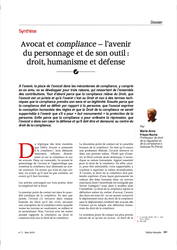
Full reference : Frison-Roche, M.-A., Avocat et Compliance - L'avenir du personnage et de son outil : Droit, Humanisme et Défense ("Attorney and Compliance - the future of the character and his tool: Law, Humanism and Defense),article of synthesis fo the collective publication "Compliance", Dalloz Avocat, March 2020, April 2020, June 2020, Dalloz Avocat, June 2020, p.321-324
Read the synthesis article (in French).
Read the editorial of the March 2020 Issue, presenting the problematic : "The Attorney, Vector of Conviction in the New Compliance System".
______
Summary of the article: In the future, the place of lawyers in compliance mechanisms, including in Ex Ante, will develop for three reasons, which emerge from all of the contributions. First of all because Compliance is a matter of Law, a lawyer is a lawyer and in the future it is a matter of Law and not on technical terms that Compliance demands its meaning and legitimacy. Then because Conformity must be defined in relation to the person, the lawyer expresses the humanist conception of the rules and Compliance Law will only be tolerable in the future if it is for "monumental goal" of protection of the person. Finally, because Compliance with ordinary repression, that the lawyer in his heart defends and must be and remain at the center of Compliance Law.
______
March 18, 2020
Publications
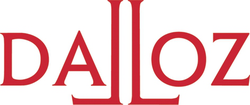
Référence générale : Frison-Roche, M.-A., L'avocat, porteur de conviction dans le nouveau système de Compliance, Dalloz Avocat, mars 2020.
This editorial opens a thematic collective publication about Compliance.
A synthetic article on all the contributions, published in May 2020, mirrors it: "Attorney and Compliance - The future of the character and his tool: Law, Humanism and Defense"
_____
English Summary of the article (written in French) :
If we perceive Compliance Law as an aggression of the private company and a binding set of mechanisms that have no meaning and added value for it, then the attorney has a utility: to defend the business. It can do so not only during the sanctions phase, but also to prevent it.
But this function is not central.
He and she becomes so if we understand Compliance Law as being a body of substantial rules, pursuing a "monumental goal": the protection of the person, goal injected by political bodies and taken up by the operator. From this, the company must convince everyone to take it back, inside the company and outside. In a general and contradictory debate, the attorney carries this conviction, because he and shed is always convincing those who in the end judge (market, public opinion, etc.) that is their raison d'être.
____
Dec. 18, 2019
Publications
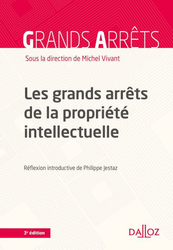
Référence complète : Frison-Roche, M.-A., Le maniement de la propriété intellectuelle comme outil de régulation et de compliance, in Vivant, M. (dir.), Les Grands Arrêts de la propriété intellectuelle, 3ième éd., 2019, 9-11, p.43-53.
This contribution is written in French.
Summary:
Intellectual Property, which comes from the State and is incorporated into public policy, can be designed not to reward the creator a posteriori, but to encourage others to innovate. It is then an Ex Ante regulatory tool, an alternative to the subsidy. If private copying is an exception, it is not in relation to the principle of Competition but in an insertion into a system of incentives, starting from the costs borne by the creator of the first innovation: the rights holder is then protected , not only according to a balance of interests involved but in order not to discourage innovative potentials and the sector itself. (1st decision) ;
The sectoral policy then permeates Intellectual Property, used to regulate a sector, for example that of the drug. While it is true that a laboratory wishing to market a generic drug did not wait for the expiration of the patent for the original drug to do so, it is however not relevant to sanction this anticipation by a few days because the investments made by the holder of the Intellectual Property right have been made profitable by this one and because the public authorities favor the generics in a concern of public health (2nd decision).
Systemic interest prevails and therefore Internet service providers have to bear the costs of blocking access while they are irresponsible because of the texts. This obligation to pay is internalized by Compliance Law because they are in the digital system best able to put an end to the violation of Intellectual Property rights which the ecosystem requires to be effective. (3rd decision).
Read the contribution (in French).
______
Nov. 20, 2019
Publications
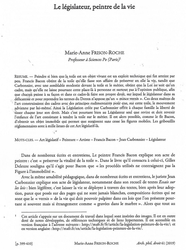
Référence générale: Frison-Roche, M.-A., Le législateur, peintre de la vie, in Archives de philosophie du droit (APD), Tome 61, 2019, pp. 339-410.
Résumé : Peindre si bien que la toile est un objet vivant est un exploit technique qui fût atteint par peu. Francis Bacon obtînt de la toile qu'elle fasse son affaire de préserver en elle la vie, tandis que Carbonnier, avec une semblable modestie devant la toile et le métier, obtînt que la Loi ne soit qu'un cadre, mais qu'elle ne laisse pourtant cette place-là à personne et surtout pas à l'opinion publique, afin que chacun puisse à sa façon et dans ce cadre-là faire son propre droit, sur lequel le législateur dans sa délicatesse et pour reprendre les termes du Doyen n'appose qu'un "mince vernis". Ces deux maîtres de l’art construisaient des cadres avec des principes rudimentaires pour que sur cette toile le mouvement advienne par lui-même. Ainsi la Législateur créée par Carbonnier offrit à chaque famille la liberté de tisser chaque jour son droit. Mais c’est pourtant bien au Législateur seul que revint et doit revenir l’enfance de l’art consistant à tendre la toile sur le métier. Il est alors possible, comme le fit Bacon, d’obtenir un objet immobile permet que surgisse sans cesse les figures mobiles. Les gribouillis réglementaires sont à mille lieux de cet Art législatif-là.
L'article ne comprend pas de reproductions, celles-ci figurent dans le document de travail.
May 16, 2019
Publications

Référence complète : Frison-Roche, M.-A., Game of Thrones : un droit si classique. Pour l'instant, in Le Pluard, Q., et Plouhinec, P., (dir.), Du droit dans GAME OF THRONES, 2019, pp. 19-34.
Résumé. Dans cette série emplie de surprises grandioses, de personnages épiques, de retournements, et ce d’autant plus qu’elle se mit à courir plus vite que le livre dont elle naquit, on semble ne trouver que ce que l'on connaît déjà du Droit : il suffirait de soulever les déguisements, comme on le fait dans une fable. On y retrouve alors les règles juridiques classiques (I), la reproduction en décalque de l'organisation juridique féodale (II), parfois contestée au nom de principes exogènes (III). Mais il est remarquable que la série ne soit pas encore finie. Or, ce qui va arriver ne renvoie-t-il pas à des problématiques juridiques que nous ne maîtrisons pas nous-mêmes ? Saison inconnue au sens plein du terme, terrain juridique glacé et sol incertain d’un Droit qui prendrait la forme des "sans-visages" et des "morts qui marchent" ? (IV).
Consulter une présentation générale de l'ouvrage.
Nov. 21, 2018
Publications
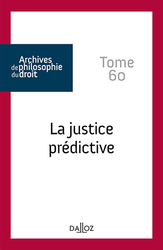
Référence générale : Frison-Roche M.-A., Pour protéger les êtres humains, l'impératif éthique de la notion juridique de personne, in in "Droit et Ethique" (dossier spécial des Archives de Philosophie du Droit) Archives de Philosophie du droit (APD), La justice prédictive, Dalloz, 2018, z, pp. 363-378.
Résumé : C'est par le Droit que l'être humain a acquis en Occident une unité (I). Ce que la Religion avait pu faire, le Droit l'a également fait en posant sur chaque être humain la notion indétachable de lui de « personne » (I.A). Mais c'est cela qui est remis en cause aujourd'hui, non pas la personnalité et le pouvoir que l'être humain a d'exprimer sa liberté mais l'unité que cela implique dans la disposition que l'on a de soir en repoussant le désir qu'autrui a toujours eu de disposer de nous. Le Droit actuel tend en effet à « pulvériser » les êtres humains en données et à transformer en prestations juridique de « consentement », cessant d'être une preuve d'une volonté libre mais devenue une notion autonome , y suffirait (I.B.).
Pour empêcher que ne règne plus que la « loi des désirs », laquelle ne fait que traduire l'ajustement des forces, il faut requérir ici et maintenant la souveraineté éthique du Droit, parce que le Droit ne peut pas être qu'une technique d'ajustement des intérêts (II). L'on peut former cette requête si l'on ne veut pas vivre dans un univers a-moral (II.A), si l'on constate que l'unité de la personne est l'invention juridique qui protège l'être humain faible (II.B.). Si on en admet l'impératif, il faut alors se demander enfin qui en Droit va l'exprimer et l'imposer, notamment de la Loi, ou du Juge, car nous semblons avoir perdu la capacité de rappeler ce principe de la Personne sur laquelle l'Occident fut si centré. Or, les principes qui ne sont plus dits disparaissent. Il ne resterait plus alors que l'ajustement au cas par cas des intérêts entre êtres humains dans champ mondial des forces particulières. À cette aune, le Droit ne serait plus qu'une technique de sécurisation des ajustements particuliers. (II.C). Réduit à cela, le Droit aurait perdu son lien avec l'Éthique.
Consulter une présentation de l'ouvrage dans lequel l'article est publié.
Voir la présentation d'autres tomes des Archives de Philosophie du Droit.
Nov. 5, 2018
Publications
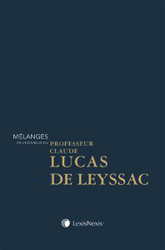
Référence générale : Frison-Roche, M.-A., Banque et concurrence, in "Mélanges en l'honneur du professeur Claude Lucas de Leyssac", LexisNexis, 2018, pp.165-180.
Résumé : Banque et concurrence ne font pas bon ménage. Ce n'est pas tant que les banques feraient figure de récidivistes à propos desquels les autorités de concurrence devraient hausser le ton par des sanctions toujours plus lourdes afin que la leçon concurrentielle soit enfin entendue. Ce sont plutôt deux ordres qui s'affrontent, deux incompréhensions face à face. En effet les banques trouvent adéquat de s'entendre pour que le système bancaire fonctionne. Plus encore, les pouvoirs publics leur demandent un comportement politique en finançant l'économie lorsque celle-ci ne s'appuie pas sur les marchés financiers, voire de lutter contre l'exclusion sociale en pratiquant « l'inclusion bancaire », bastion avancé de la conception de l'entreprise promue par le Plan très politique d'Action pour la Croissance et le Transformation des Entreprises (PACTE). dès lors, comment elles-mêmes auraient-elles un comportement de marché consistant dans un comportement égoïste et d'agression envers leur homologue ?
Si l'on plonge dans ce creuset de l'incompréhension qui engendre le heurt violent entre les banques, qui évoquent leur mission, et les autorités de concurrence, qui se prévalent de la leur, on bute sur l'écueil de la définition même de ce qu'est une banque. L'on peut estimer qu'une banque est un prestataire de services divers, agissant sur des marchés en concurrence ; le droit assure le bon fonctionnement de ceux-ci, les autorités qui gardent l’efficacité des marchés se saisissant des banques qui y exercent leurs activités. Mais si l'on choisit d'insister sur le fait que les banques sont ce qui fait fonctionner l'économie et consolident le lien social, elles sont alors partie intégrante d'un système propre : le système bancaire, lequel est un élément essentiel de la société. La concurrence n'y est plus qu'adjacente.
July 3, 2018
Publications
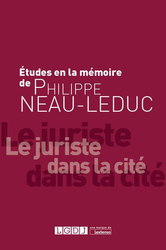
► Full Reference: Frison-Roche, M.-A., Dessiner les cercles du Droit de la Compliance, in Études en l'honneur de Philippe Neau-Leduc, Le juriste dans la cité, coll. « Les mélanges », LGDJ-Lextenso, 2018, pp. 483-496.
____
🚧this article is based on a Working Paper, with footnotes, technical references and hypertext links.
This Working Paper is freely available :
- in French: Tracer les cercles du Droit de la Compliance.
- in English: Drawing the circles of Compliance Law.
____
► English Summary of this article: Compliance Law has the same teleological functioning as the Economic Law to which it belongs, which consists in placing the normativity of rules, decisions and reasoning in the aims pursued. Once we know what the goals of compliance techniques are, then we know who should be responsible for them, who must be subject to them, who must activate the rules: compliance rules must be activated by those who are in the best position to achieve the outcome in order to achieve the goal sought by the authority which designed the compliance mechanism. The "circles" are thus plotted in a rational and pragmatic way. That, all of it ("useful effect"), but not beyond that. The notion of efficiency does not always imply balancing: on the contrary, it can involve drawing circles which designate those who are "placed" to carry the burden of the rules because they are capable of producing them the desired effects. Within these circles, the rules must apply without restriction and without compromise, but they must not apply beyond these circles.
Drawing such circles requires defining the Law of Compliance itself, since on the one hand the choice of those who must implement the Compliance depends on the aims of the Compliance and on the other hand the definition of the Law of Compliance is itself teleological in nature. This is why, contrary to the assertion that the exercise of definition would be useless in these matters, which would be above all on a case-by-case basis, this effort to define and determine the purposes is, on the contrary, necessary in practice to show which enterprise must bear the obligations of compliance and which must not.
But it is enough to have posed this to reveal the major difficulty of the Compliance, that explains resistances, and even gives the impression that one is confronted with an aporia. If, as a matter of principle, what is expected of the "users" of the Compliance mechanisms must be articulated to the aim that is affected by the authors of the compliance mechanisms to them, we must have a minimum correspondence between the aims of these authors (Legislators and Regulators) and the aims pursued by those who are responsible for implementing them: companies. However, this correspondence does not exist at first sight, because the compliance mechanisms are found to be uniquely based on "monumental goals" which the public authorities have a legitimate concern, whereas companies have for their own interest . The two circles do not match. The internationalization of concern for these aims in companies would therefore be only a mechanism of violence of which enterprises are the object, violence felt as such. (I).
To resolve this violence, it is better to stop confusing the State and enterprises, whose goals are not the same, and draw the circle of subjects of law "eligible" for Compliance. It is highly legitimate to target certain entities, in particular this category of companies, which are the "crucial operators", in a binding way, as it is legitimate to govern companies that have expressed a desire to surpass their own interests. These circles of a different nature can overlap on a concrete operator: for example, if a bank - always a crucial operator that is structural because it is systemic - is also international - a crucial operator because of its activity - decides to worry about others by commitments verified by the authorities to overcome their own interest (social responsibility), but these different circles are not confused. In any case, companies may belong to only one circle, or even belong to none. In the latter case, they must therefore remain beyond the reach of the pressure and cost of Compliance Law, in particular because they are not objectively required to realize the "monumental goals" aimed at effectiveness and do not want it: in a liberal system, it is for the public authorities to aim at the general interest, the ordinary people indirectly participating in it by paying the tax. (II).
It is by making these "Compliance Circles" of eligible subjects of this specific Law to implement the heavy but justified and controlled burden of Compliance with regard to the monumental goals that this new system aims, that then opens a royal way in order to find a uniqueness and to increase the "monumental function" of the Compliance Law by a relation of Trust towards the global general interest, rather than the mechanical application of rules whose meaning is not understood and whose perception is no longer perceived than violence.
____
________
June 27, 2018
Publications

Référence complète : Frison-Roche, M.-A., Le Juge, le Régulateur et le Droit, in L'ENA hors les murs, Le droit et la justice aujourd'hui. Et demain ?, n°481, 2018, pp.72-73.
Résumé. Du Juge, du Régulateur et du Droit, c'est plutôt le "Régulateur" qui vient en premier, mais cette prééminence vint parfois sur ordre du juge plutôt que sur décision autonome de l'État, même s'il s'avère que c'est toujours, voire avant tout, pour fonder une relation de confiance qu'un Régulateur est établi (I). Institué, le Régulateur doit se comporter dans ses pouvoirs ex post comme un Juge (II). Lorsque le Régulateur est en contact avec les juges, rapport obligé puisque que le Régulateur est soumis au Droit, l'entente est plus ou moins cordiale (III) et c'est la tension des relations entre Droit et Économie qui transparaît alors. Mais l'Europe est l'espace où les conciliations se font plus aisément, notamment grâce à la puissance et l'autorité de ses Juges, comme le montre l'Union bancaire (IV). La mondialisation ayant rebattu la carte des puissances et des dangers, les prétentions du Droit sont aujourd'hui internalisées dans les entreprises mêmes : le Droit de la Régulation se transforme en Droit de la Compliance, par lequel l'"entreprise cruciale" devient une structure qui juge et applique , y compris à elle-même, des normes mondiales pour atteindre des "buts monumentaux" exprimés par les États (V). En cela la "lutte pour le Droit" pourrait se faire dans un nouveau jeu entre les entreprises, les Juges et les Régulateurs.
Cet article s'appuie sur un document de travail.
Celui est doté de notes de bas de pages, de références techniques et de liens hypertextes.
Il est accessible en langue française par le lien suivant : Le Juge, le Régulateur et le Droit.
Il est accessible en langue anglaise par le lien suivant : The Judge, the Regulator and the Law.
May 22, 2018
Publications
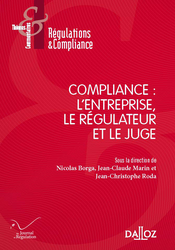
Référence complète : Frison-Roche, M.-A., Entreprise, Régulateur, Juge : penser la compliance par ces trois personnages, in Borga, N., Marin, J.-Cl. et Roda, J.-Cl. (dir.), Compliance : l'entreprise, le régulateur et le juge, Série Régulations & Compliance, , Dalloz, 2018, p. 1 à 11.
Lire une présentation générale de l'ouvrage dans lequel est publié l'article.
Consulter les autres titres de la Série dans laquelle est publié l'ouvrage.
Lire le document de travail sur la base duquel s'appuie l'article
Read the working paper on which the article is based : Enterprise, Regulator, Judge: thinking Compliance by these three Characters.
Lire la présentation de l'autre article de Marie-Anne Frison-Roche dans cet ouvrage : Compliance : avant, maintenant, après.
_____
RÉSUMÉ : L'Entreprise, le Régulateur et le Juge sont trois personnages capitaux pour la construction d'un Droit de la compliance qui émerge. Un risque important tient dans une confusion de leur rôle respectif, l'entreprise devenant régulateur, le régulateur devenant conseil d'une place qui va à la conquête des autres, le juge se tenant en retrait. Il convient que chacun tienne son rôle et que leur fonction respective ne soit pas dénaturée. Si cette confusion est évitée, alors les points de contact peuvent se multiplier et on l'observe. Mais dès l'instant que chacun reste à sa place, l'on peut aller plus loin que ces points de contacts et s'ils en étaient d'accord, les trois personnages peuvent tendre vers des buts communs. Cela est d'autant plus légitime que le Droit de la Compliance, comme le Droit de la Régulation est de nature téléologique, ce qui rend ces branches du Droit profondément politiques. Ces buts communs sont techniques, comme la prévention des risques. Ils peuvent être plus politiques et plus hauts, s'il y a une volonté partagée, sans jamais l'un des personnages se fonde dans un autre : il s'agit alors de se soucier avant de l'être humain. La désignation de ce but commun à l'Entreprise, au Régulateur et au Juge peut s'exprimer par un mot : l'Europe.
ABSTRACT: The Company, the Regulator and the Judge are three key figures for the construction of an emerging Law of Compliance. An important risk lies in a confusion of their respective roles, the company becoming a regulator, the regulator becoming a board of a place that goes to the conquest of others, the judge standing back. It is appropriate that each plays his role and that their respective function is not distorted. If this confusion is avoided, then the points of contact can multiply and one observes it. But as soon as everyone remains in their place, we can go further than these points of contact and if they agreed, the three characters can reach common goals. This is all the more legitimate since the Law of Compliance, as the Law of Regulation, is teleological in nature, which makes these branches of law profoundly political. These common goals are technical, such as risk prevention. They can be more political and higher, if there is a shared will, without ever one of the characters being captured by another: it is then to concern by the human being. The designation of this common goal to the Company, the Regulator and the Judge can be expressed in one word: Europe.
May 22, 2018
Publications

♾️ suivre Marie-Anne Frison-Roche sur LinkedIn
♾️ s'abonner à la Newsletter MAFR Regulation, Compliance, Law
____
► Référence complète : M.-A. Frison-Roche, "Compliance : avant, maintenant, après", in N. Borga, J. -Cl. Marin et J.-Ch. Roda, J.-Cl. (dir.), Compliance : l'entreprise, le régulateur et le juge, Série Régulations & Compliance, Dalloz, 2018, p. 23-36.
____
____
🚧 Lire le document de travail sur la base duquel s'appuie l'article
🚧 Read the working paper on which the article is based : Compliance : Before, Now, After.
____
📝Lire l'autre article publié par Marie-Anne Frison-Roche dans cet ouvrage : Entreprise, Régulateur, Juge : penser la compliance par ces trois personnages.
______
► Résumé de l'article : Autant l'admettre. Parce que devant des règles de "Compliance si nombreuses et si disparates l'on a tant de mal à s'y retrouver, l'on est contraint à partir dans des directions si changeantes, que nous nous consolons de leur poids, de leur coût et de l'incompréhension que nous en avons en disant que la "Compliance" est "complexe" et "transdisciplinaire", comme si les mots compliqués pouvaient masquer notre désarroi. Mais la "Compliance" n'est pas un cataclysme, une bombe envoyée par les américains pour anéantir l'Europe, la nouvelle forme d'une Guerre froide en habits juridiques ; c'est une façon de voir des choses qui vient de loin, avec une cohérence qui lui est propre et qu'il faut avant tout comprendre. Pour mieux s'y déployer.
Si l'on comprend d'où vient ce nouveau corpus qui contraint aujourd'hui les entreprises à prouver qu'elles prennent effectivement en charge la concrétisation de certains buts qui les dépassent, notamment la lutte contre le blanchiment d'argent, la fraude fiscale, mais aussi la lutte contre la vente des êtres humains ou la lutte pour la préservation de la nature et de la planète, alors l'on peut continuer l'histoire, dans une nouvelle alliance entre certaines entreprises et les autorités publiques.
En effet, toutes les entreprises ne sont pas visées par une telle internalisation de "buts monumentaux" en leur sein. Une entreprise ordinaire a quant à elle vocation à se développer pour réaliser un but qui est le sien. Le système de Compliance ne peut concerner que des "entreprises cruciales". S'il doit y avoir changement de projet poursuivi par l'entreprise, cela ne peut tenir qu'à sa "position" dans un système. Cette position peut avoir une source objective (entreprise systémique) ou une source subjective, parce que l'entreprise veut concrétiser ces buts globaux car elle veut être "responsable". Dans ce cas, l'entreprise supporte alors la charge de preuve qu'un tel discours de responsabilité nouvelle correspond à un comportement et à une culture effective. Le poids des règles existe déjà aujourd'hui. Et c'est encore comme cela qu'aujourd'hui d'une façon négative et passive que la Compliance est perçue, par ceux qui la "subissent" (entreprises), voire par ceux qui l'appliquent (autorités publiques).
La transformation vers une "culture de confiance, c'est l'enjeu d'un passage entre aujourd'hui et demain. En effet demain, c'est une relation de confiance qui pourrait se construire entre ces entreprises-là et les autorités publiques, parce qu'elles partageaient les informations (enjeu systémique), parce qu'elles seraient d'accord sur les buts monumentaux (tous centrés sur la protection des êtres humains, que le seul fonctionnement marchand ne peut produire, que les seuls États ne peuvent assurer).
En cela, la "Compliance" est avant tout un pari, celui de la place des êtres humains sur des marchés mondialisés.
____
English Summary of the article. We have to admit, because we find it difficult to find ourselves in front of so numerous and disparate rules, going in all directions and constantly changing, we console ourselves with their weight, their cost and our misunderstanding by affirming that Compliance is "complex" and "transdisciplinary", as if complicated words could mask our disarray. But "Compliance" is not a cataclysm, a bomb sent by the Americans to annihilate Europe, the new form of a Cold War in legal dress, it is a way of seeing things that comes from afar, with a coherence of its own and which must first be understood.
If one understands where this new corpus comes from, which now obliges companies to prove that they effectively take on the fulfillment of certain goals that go beyond them, notably the fight against money laundering, tax evasion , but also the fight against the sale of human beings or the struggle for the preservation of nature and the Earth, then we can continue the story.
Indeed, not all companies are targeted by such internalization of "monumental goals" within them." An ordinary enterprise is destined to develop itself in order to achieve a goal which is its own. The concern of these goals can only be for the "crucial enterprises. "If there is to be a change in the corporate project, then it can only depend on its" position "in a system, a financial, economic, social, global system, or because it has itself decided that it would be so. The company then bears the burden of proof that such a discourse of new responsibility corresponds to a behavior and an effective culture. The weight of the rules already exists today. And it is for the moment that now, in a negative and passive way, Compliance is perceived, by those who "undergo" it (companies), even by those who apply it (public authorities).
The transformation towards a "culture of trust" is the issue between today and tomorrow, because tomorrow, it is a relationship of trust that could be built between these companies and the public authorities, because they would share information (systemic issue), because they would agree on the less technical monumental goals (protection of human beings issue).
In this, "Compliance" is above all a bet, that of the place of human beings in globalized markets.
____
Consulter les autres titres de la Série dans laquelle est publié l'ouvrage.
March 28, 2018
Publications
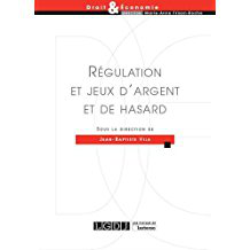
Référence complète : Frison-Roche, M.-A., Décider aujourd'hui de la régulation des jeux pour qu'ils aient un avenir, in Vila, J.-B. (dir.) Régulation et jeux d'argent et de hasard, coll. " Droit et Économie" LGDJ, Lextenso éditions, 2018, p. 255-272.
Le Droit de la Régulation exprime un rapport nouveau entre les règles et les faits, rapport tendu entre l’Économie, le Droit et le Politique, aucun ne pouvant d'une façon définitive ni exclure ni même dominer les deux autres. Si l'ouverture de l'espace virtuel bouleverse les jeux plus encore que d'autres activités humaines - car l'on s'amuse tant dans le numérique ! -, ce rapport et cette tension demeurent. Mais les prétentions varient parce que si l’État prétendait naguère être le maître, c'est davantage les opérateurs économiques, arguant à la fois de l'ordinaire concurrentiel et du fait technologique, montré comme prouesse, qui prétendent aujourd'hui être les maîtres, le droit allant de l'un à l'autre, l'éthique ayant bien du mal à trouver son chemin. Il faut dire que morale, jeu et plaisir ont toujours eu du mal à converser.
C'est donc la question de la spécificité des jeux, entraînés vers un destin banal qui est aujourd'hui posée (I). Sur une sorte de surréaction, les jeux apparaissent dans leurs traits contraires renforcés, à la fois la dimension financière plus que jamais présente, peut-être devenue première, alors que la dimension politique demeure revendiquée (II). La question première est alors celle de l'avenir : allons-nous vers un mécanisme ordinaire de plaisir et de désir de s'amuser, s'amuser à tout prix, ou bien la régulation a-t-elle pour objet de brider cette tendance naturelle d'offrir à chacun l'objet de son désir de jeu, ou bien la régulation ne peut-elle au contraire avoir pour ambition d'offrir à travers le jeu plus que le jeu, par exemple l'éducation ? (III)
Lire le document de travail sur la base duquel l'article a été rédigé.
Ce document de travail a été actualisé depuis le moment où l'article a été transmis à l'éditeur.
Consulter l'ouvrage dans lequel l'article a été publié.
Consulter la collection dans laquelle l'ouvrage a été publié.
Dec. 11, 2017
Publications
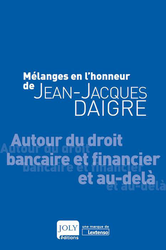
► Référence complète : Frison-Roche, M.-A., Compliance et confiance, in Mélanges en l'honneur de Jean-Jacques Daigre, Autour du droit bancaire et financier, Joly éditions - Lextenso, déc. 2017, pp.279-290.
____
► Résumé de l'article : Compliance. Confiance. Deux mots qui reviennent de plus en plus souvent sous nos yeux de lecteurs ou à nos oreilles d'auditeurs. Et pourtant ils ne semblent pas bien s'assortir. Ils paraissent même se repousser l'un l'autre.
En effet, la compliance est ce par quoi les autorités publiques font confiance à certains opérateurs privés, non pas en eux-mêmes, mais à leurs capacités structurelles à capter mécaniquement l'information dont ces autorités ont besoin (I).
Cela suppose une vision du monde dans lequel les entreprises sont puissantes et sont seules puissantes mais ne sont pas vertueuses, tandis que les autorités publiques, comme le Ministère public ou les régulateurs, sont faibles mais sont seuls vertueux. Une telle conception de la compliance transforme les entreprises en automates. Une telle vision du monde n'a pas d'avenir : on ne peut faire confiance qu'à des êtres humains, dont il faut accepter le caractère faillible, la compliance étant alors l'expression d'un rapport noué sur une confiance qui se donne à voir entre des opérateurs non mécaniques, à savoir les institutions publiques et les opérateurs privés qui peuvent l'un et l'autre avoir en commun souci d'un intérêt qui les dépasse et que l'on appelait naguère l'intérêt général (II).
____
🚧 Lire le document de travail bilingue servant de base à l'article ici publié.
____
Lire une présentation générale de l'ouvrage dans lequel l'article est publié.
____
____
Oct. 31, 2017
Publications
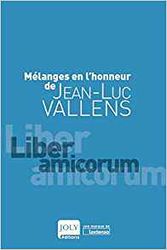
► Référence complète : D. d' Ambra et M.-A. Frison-Roche, "La résolution bancaire entre droit commun des procédures collectives et droit commun de la régulation", in Mélanges en l'honneur de Jean-Luc Vallens. Liber amicorum, Joly éditions - Lextenso, oct. 2017, p.293 à 303.
____
► Résumé de l'article : En organisant la "résolution bancaire" et en présentant celle-ci comme une "procédure collective spéciale", le Droit a-t-il le front de poser la question : l' État est-il mortel ? Par nature, le droit des successions suppose la mortalité des êtres humains. Par nature, le droit des procédures collectives suppose la mortalité des entreprises. La résolution bancaire a été inventée récemment parce que pourraient mourir des opérateurs économiques peu ordinaires et intimes de l’ État , les banques qui s'adossent à celui-ci et lui empruntent sa puissance de création monétaire. Mais à l'inverse de la représentation que le Droit se fait des êtres humains et des entreprises, le Droit comme la politique supposait l'immortalité de l’ État . Les marchés en évoquant sans cesse la "faillite des États" sont-ils en train de remettre en cause cela ?
La Résolution bancaire, si elle ne devait être qu'un espace de procédure collective, en ce qu'elle serait rattachée à des États eux-mêmes "en difficulté" ouvre cette question-là.
____
📗Consulter une présentation générale de l'ouvrage.
____
🚧Lire le working paper bilingue ayant servi de base à l'article, s'appuyant sur le Dictionnaire bilingue du Droit de la Régulation et de la Compliance, comprenant des références, des notes de bas de page développant certains points et des liens menant vers des documents.
________